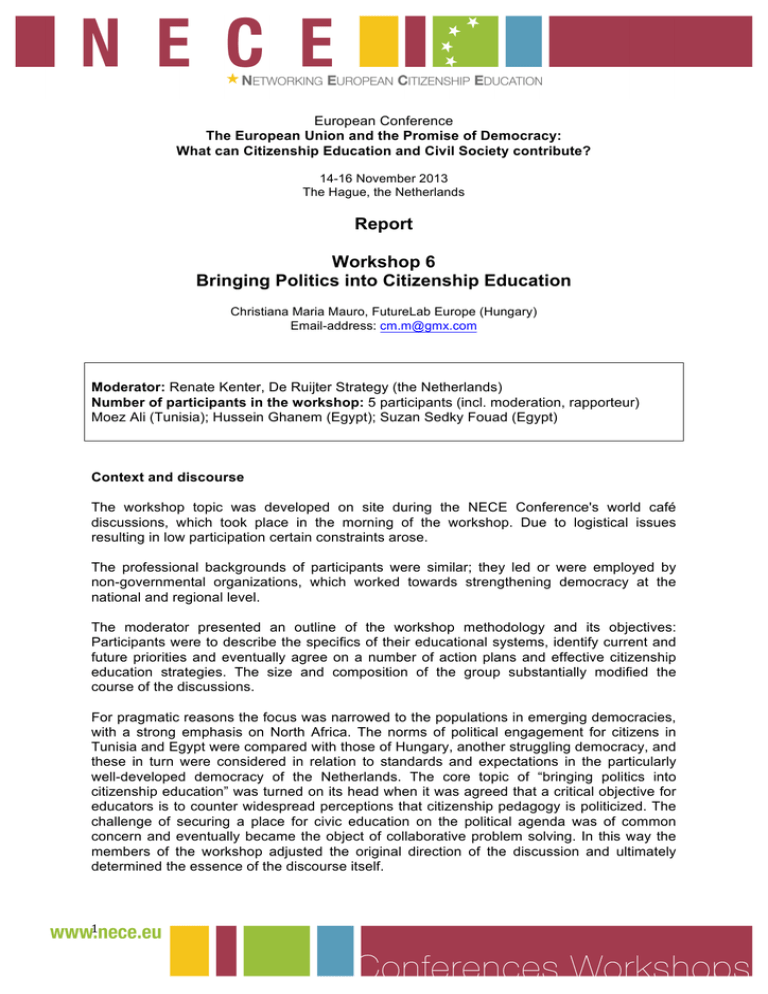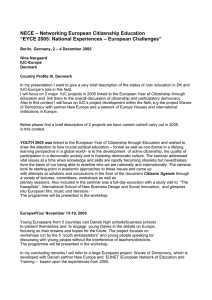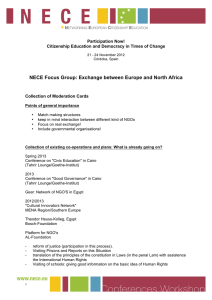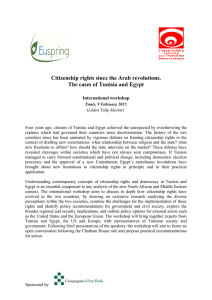Document 13156761
advertisement

European Conference The European Union and the Promise of Democracy: What can Citizenship Education and Civil Society contribute? 14-16 November 2013 The Hague, the Netherlands Report Workshop 6 Bringing Politics into Citizenship Education Christiana Maria Mauro, FutureLab Europe (Hungary) Email-address: cm.m@gmx.com Moderator: Renate Kenter, De Ruijter Strategy (the Netherlands) Number of participants in the workshop: 5 participants (incl. moderation, rapporteur) Moez Ali (Tunisia); Hussein Ghanem (Egypt); Suzan Sedky Fouad (Egypt) Context and discourse The workshop topic was developed on site during the NECE Conference's world café discussions, which took place in the morning of the workshop. Due to logistical issues resulting in low participation certain constraints arose. The professional backgrounds of participants were similar; they led or were employed by non-governmental organizations, which worked towards strengthening democracy at the national and regional level. The moderator presented an outline of the workshop methodology and its objectives: Participants were to describe the specifics of their educational systems, identify current and future priorities and eventually agree on a number of action plans and effective citizenship education strategies. The size and composition of the group substantially modified the course of the discussions. For pragmatic reasons the focus was narrowed to the populations in emerging democracies, with a strong emphasis on North Africa. The norms of political engagement for citizens in Tunisia and Egypt were compared with those of Hungary, another struggling democracy, and these in turn were considered in relation to standards and expectations in the particularly well-developed democracy of the Netherlands. The core topic of “bringing politics into citizenship education” was turned on its head when it was agreed that a critical objective for educators is to counter widespread perceptions that citizenship pedagogy is politicized. The challenge of securing a place for civic education on the political agenda was of common concern and eventually became the object of collaborative problem solving. In this way the members of the workshop adjusted the original direction of the discussion and ultimately determined the essence of the discourse itself. 1 Involvement on the part of each participant was of necessity considerable. This helped to deepen awareness of different regional challenges for the group. While all experts were invited to elaborate on their input, some had to be encouraged more emphatically to share their views. Ample opportunity to contribute on the part of workshop participants also served to foreground an important distinction between emerging democracies and Western European societies: populations in new democracies are transforming—rapidly or more gradually, as social and political circumstances dictate—from 'subjects' into 'citizens', whereas the historical conditions of the latter have equipped them with a sociological framework that supports citizen engagement. Positions and outcomes At the beginning of the workshop participants were asked to communicate the conditions of citizenship education in their respective countries. One issue raised at the outset, discussed at length and found to be common to Egypt, Tunisia and Hungary was a perceived need to disassociate citizenship education from what target groups often experience as a politically motivated agenda. As politicians are prone to employ the language of 'rights' and 'democratic principles' to further political agendas, which are not necessarily democratic, citizens may experience a certain dissonance with this vocabulary. In Hungary, even the term 'human rights' carries negative associations for much of the population. For many, 'democracy' is equated not so much with freedom as it is with wild capitalism and resentment of the illegal accumulation of wealth of the political class. How to promote democratic values without overstepping the frontiers of politically neutral citizenship pedagogy was seen as a problem that merited a considered analysis. It was conceded that people were wistful about the kind of license that was common under a non-democratic regime; consequently, a rights and duties framework would be perceived, for some, as threatening if there is a failure to acknowledge and contextualize certain social customs. On the one hand, there are deep-rooted cultural norms, which need to adapt to the new political situation, and on the other, there is collective uncertainty about a leap into unfamiliar territory. Attention was also drawn to the concession that people in emerging democracies were also accustomed to subjection—and accustomed to accepting it as such. What is more, despite a lack of justice under authoritarian rule, there had nonetheless existed a degree of stability and predictability, conditions that turned precarious following dramatic political changes. This frame of reference was said to be the greatest impediment to teaching individuals to perceive their role in society and politics as active. This was also the basis upon which the first key proposition was decided upon: that many see citizenship educators as political agents, and the inclusion of political discussion in the curriculum may interfere with effective civic education. In countries that had undergone a revolution the distance between the sphere of politics and the everyday life of the citizenry was vast, and there was scarcely time to prepare new political actors for the change, let along the citizenry. On the other hand, as one of the participants put it: “In Egypt revolutionary change offered a unique opportunity to reach out to people with education about their rights”. She added that working with target groups (such as children, farmers and the disabled community) had been quite effective and showed that special interest groups sometimes learned how to fight strategically for their own interests relatively fast. The work of civil society organizations in both Tunisia and Egypt focused on definitions of rule of law and rights education, but also offered opportunities for citizens to share their own ideas about democracy. A number of complementary programmes were implemented that would offer forums for debate. It was noted that in Europe this was an important element which had been missing in the European project and that the current crisis in the EU could likely be attributed to the absence of this inclusive component. 2 While there is always a chance that circumstantial events can trigger a desire to engage oneself politically, as the events in Egypt and Tunisia show (and 1956 revolutionary Hungary), top-down transitions do not encourage citizen participation; there was consensus that citizens must be included in the democratic process from the start. The second stage in the workshop allowed for a discussion of the notes generated during the world café. The issues were broad in scope and while some of them were thought to articulate concerns that participants could identify with, others were perceived as controversial or “overly abstract”. The value of various curriculum priorities was debated, and there appeared to be agreement that it was of fundamental importance to teach bridgebuilding skills, particularly in divided communities or urban areas with less homogeneity; skills for engaging in an effective dialogue were seen to be essential to enable the creation of spaces where societal differences could be both acknowledged and permitted. It was also agreed that this should be the foundation of any good citizenship education curriculum, together with critical thinking skills and comparative political philosophy. Two contributors noted that “teaching about institutions can wait”. Different types of democratic deficits were explored when experts were asked to share their visions and expectations of the future. While the issue of under-representation of marginalized populations, minorities and the poor, and the over-representation of moneyed interest groups was considered “par for the course”, the deficit in representation of the majority was viewed as a primary objective of citizenship education. Particularly in societies where extreme passivity is the norm, civic empowerment and positive expectations need to be nourished continually with examples of success. According to the members of the workshop, the process of developing analytical skills, theoretical understanding and “thinking tools” is an important part of the long-term strategy to allow individuals to contextualize democracy. Comprehension of what ''political activity'' might mean on a personal level, or what ''promoting a position'' might mean in practice were offered as examples of short-term goals. It was decided that if an informed and involved citizenry is the goal of civic education, “we need to begin with the basics” by introducing the notions of rights and duties, but that a long-term process requires a development strategy. The timing of when to introduce politics into the curriculum was seen as crucial. There was consensus about a strong need for civil society to support this entire process. The question “what needs to be done and by whom?” led to further interrogations of theoretical disparities between projects funded by civil society and those funded by the government. Non-governmental organizations typically support members of society and policy areas that are often ignored by the government, but both actors were considered essential: the state must lead with formal education, but monitoring of curriculum development by watchdog organizations is critical to success. This question eventually led to presentations of practical examples of civil society projects that had either already taken place or were in the planning stages. Projects centered on proximity work and field activities or working directly with decision-makers. Civil society projects of interest included efforts in Tunisia to convince the government to introduce quotas for women candidates, and lobbying to ensure that the succession of candidates on electoral lists be ordered to end the practice of surreptitiously preventing the election of female candidates; an Egyptian project designed to encourage a culture of volunteerism recruited young people who traveled to communities around the country promoting, through example, the benefits of donating time and energy for the sake of the community. This project also included training of local volunteers; a project in Tunisia trained women selected on the basis of leadership potential how to run for office, how to manage a 3 campaign and how to defend their positions. Its goal was to thwart the practice of fulfilling quota requirements for women by selecting “non-threatening” candidates. It also funded NGOs supporting women's issues and minorities who organized workshops to raise awareness about the importance of political engagement, encouraging them to create their own list of candidates. An ether pad was used to facilitate collaboration, but only served its purpose during the consensus-achieving process as a visual aid. The group recommended that during the next NECE Conference organizers consider devoting space for a ''project village" in order to showcase creative and successful projects. Conclusion While it was unfortunate that the focus on EU citizenship education was set aside, the impromptu framework of reference developed during the workshop resulted in a number of positive practical outcomes. Differentiating between strengths and weakness in European and North African emerging democracies was found to clarify citizenship education agenda priorities. The size of the workshop and the background of participants might account for the neglect of theoretical debate, but it nonetheless offered the opportunity for a closer look at highly original projects developed in Northern Africa which may have practical relevance for citizenship educators in Europe. 4




